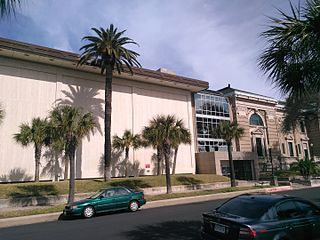The Institute for Historical Review (IHR), founded in 1978, is an American organization best known for publishing articles and books promoting Holocaust denial, a practice which attracted notoriety to the IHR. It is considered by many scholars to be central to the international Holocaust denial movement. IHR promotes antisemitic viewpoints, and well as having links to neo-Nazi organizations. The Institute published the Journal of Historical Review until 2002, but now disseminates its materials through its website and via email. The Institute is affiliated with the Legion for the Survival of Freedom and Noontide Press.

Walker County is a county located in the east central section of the U.S. state of Texas. As of the 2010 census, its population was 67,861. Its county seat is Huntsville. Initially, Walker County was named for Robert J. Walker, a legislator from Mississippi who introduced into the United States Congress the resolution to annex Texas. Walker later supported the Union during the Civil War and earned some enmity. In order to keep the county's name, the state renamed it for Samuel H. Walker, a Texas Ranger and soldier in the United States Army.

Harris County is a county located in the U.S. state of Texas, located in the southeastern part of the state near Galveston Bay. As of the 2010 Census, the population was 4,092,459, making it the most populous county in Texas and the third most populous county in the United States. Its county seat is Houston, the largest city in Texas and fourth largest city in the United States. The county was founded in 1836 and organized in 1837. It is named for John Richardson Harris, who founded the town of Harrisburg on Buffalo Bayou in 1826. According to a July 2017 Census estimate, Harris County's population had grown to 4,652,980, comprising over 16 percent of Texas's population.

Coryell County is a county located on the Edwards Plateau in the U.S. state of Texas. As of the 2010 census, its population was 75,388. The county seat is Gatesville. The county is named for James Coryell, a frontiersman and Texas Ranger who was killed by Comanche Indians while protecting settlers.

Fredericksburg is the seat of Gillespie County, in the U.S. state of Texas. As of the 2010 Census, the city had a population of 10,530.

Longview is the forty-fifth largest city in the state of Texas. The city is mostly located in Gregg County, of which it is the county seat; a small part of Longview extends into the western part of neighboring Harrison County. Longview is located in East Texas, where Interstate 20 and U.S. Highways 80 and 259 converge just north of the Sabine River. According to the 2010 U.S. census, the city had a population of 80,455. The estimated population in 2017 was 81,522. Longview is the principal city of the Longview metropolitan statistical area, comprising Gregg, Upshur, and Rusk counties. The population of the metropolitan area as of 2017 census estimates is 217,481.

The Texas Medical Center (TMC) is a 2.1-square-mile (5.4 km2) medical district and neighborhood in south-central Houston, Texas, immediately south of the Museum District and west of Texas State Highway 288. Over sixty medical institutions, largely concentrated in a triangular area between Brays Bayou, Rice University, and Hermann Park, are members of the Texas Medical Center Corporation—a non-profit umbrella organization—which constitutes the largest medical complex in the world. The TMC has an extremely high density of clinical facilities for patient care, basic science, and translational research.

The University of Texas at San Antonio (UTSA) is a state research university in San Antonio, Texas, United States. With nearly 31,000 students, it is the largest university in San Antonio and the eighth-largest (2014) in the state of Texas. It includes three campuses across the San Antonio metropolitan area that span 725 acres of land. UTSA offers a wide array of academic studies, with 67 bachelor's, 69 master's and 24 doctoral programs. In 2012, 2013, 2014, 2016 and 2017, it was selected by Times Higher Education as one of the best universities in the world under 50 years old.

Boulevard Oaks is a neighborhood in Houston, Texas, United States, containing 21 subdivisions north of Rice University and south of U.S. Highway 59. Developed primarily during the 1920s and 1930s, Boulevard Oaks contains two National Register historic districts, Broadacres and Boulevard Oaks. The Boulevard Oaks Civic Association (BOCA) is the common civic association for all 21 subdivisions.
Belford University was an organization that offered online unaccredited degrees for "life experience". The organization maintained a post office box in Humble, Texas, but its certificates were mailed from the United Arab Emirates. Along with many similar websites, it was owned by the Karachi-based company Axact, the main business of which, according to a New York Times investigation, is "to take the centuries-old scam of selling fake academic degrees and turn it into an Internet-era scheme on a global scale". In July 2018, Shoaib Ahmed Sheikh,the CEO of Axact was arrested and sentenced to prison for 20 years for his role in perpetuating this scam.

Rosenberg Library, a public library located at 2310 Sealy Street in Galveston, Texas, United States, is the oldest continuously operating library in Texas. It serves as headquarters of the Galveston County Library System and its librarian also functions as the Galveston County Librarian.

Radha Madhav Dham, originally called Barsana Dham is the main U.S. center of Jagadguru Kripalu Parishat, a non-profit, charitable, educational and spiritual organisation located on more than 200 acres of land in Hays County, south of Austin, Texas. It is a Hindu temple and ashram complex, the oldest Hindu Temple in Texas the largest in North America and one of the largest Hindu Temple complexes in the Western Hemisphere.
The Nazarene International Education Association (NIEA) is a part of the Church of the Nazarene. The Church of the Nazarene owns and operates 11 liberal arts institutions in Africa, Canada, Korea, and the United States, as well as 3 graduate seminaries, 37 undergraduate Bible/theological colleges, 3 nurses training colleges, 1 junior college, and 1 education college worldwide. At least in terms of the American institutions, the Church of the Nazarene seems to have changed its original official philosophy of abandoning academies, bible colleges, and universities to focus on liberal arts colleges, as 7 of the 8 "liberal arts colleges" call themselves universities, and there is now a bible college in Colorado Springs. The early-twentieth-century philosophy, as expressed by J.B. Chapman:
It was originally the plan to call every school we started a “university” ... It was our ultimate aim to have universities and our schools were named according to our vision of future developments. But I am, personally, convinced that we should definitely abandon the idea of building any universities, that we should drop these names from our schools... [Moreover,] it is my conclusion that we ... cannot permanently maintain academies and they do not meet our need, that a special Bible school does not meet our needs and that we should express ourselves on this conviction.... That the College, with the necessary fitting school and Bible department[,] is the school that we need and will build."
The Texas State Historical Association (TSHA) is a non-profit educational organization, dedicated to documenting the history of Texas. It was founded in Austin, Texas, on March 2, 1897.
The Journal of South Texas is a biannual peer-reviewed academic journal published for the South Texas Historical Association by Texas A&M University-Kingsville. The editor-in-chief is Alberto Rodriguez. It was established in 1974 and covers the history and heritage of greater Texas.

Texas is the second most populous U.S. state, with an estimated 2017 population of 28.449 million. In recent decades, it has experienced strong population growth. Texas has many major cities and metropolitan areas, along with many towns and rural areas. Much of the population is in the major cities of Houston, San Antonio, Dallas, Fort Worth, Austin, and El Paso.
The Commission on Accreditation of Medical Transport Systems (CAMTS), is an independent, non-profit agency based in Sandy Springs, South Carolina, which audits and accredits fixed-wing, rotary wing, and surface medical transport services worldwide to a set of industry-established criteria. CAMTS has accredited 182 medical transport programs worldwide as of February, 2017.
Mexicans in Omaha are people living in Omaha, Nebraska, United States who have citizenship or ancestral connections to the country Mexico. They have contributed to the economic, social and cultural well-being of Omaha for more than a century. Mexicans, or Latino people identified incorrectly as being from Mexico, have been accounted for in the history of Omaha, Nebraska since 1900. The entire Latino population of Omaha increased ninety percent between 1990 and 1997.

The Catholic Medical Association is an organization of Catholic physician, dentists and health care professionals in the United States and Canada. It has about 900 members.














